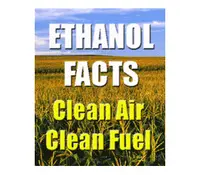Detroit News Story Goes Overboard in Slamming Ethanol
 |
Is this canard the latest effort by the gasoline lobby to derail alternative fuel initiatives?
By Marc J. Rauch
Exec. Vice President/Co-Publisher
The Auto Channel
On Monday, September 28, 2009, David Shepardson of the Detroit News' Washington Bureau published a story titled "Carmakers Fight Hike In Ethanol At Pump,” that is as irresponsible a piece of journalism as you’d ever find. (CLICK HERE to read the text from the original article)
The story’s sub-headline and first paragraph insinuate that ethanol is too costly and that its use can damage engines. Unfortunately, this scurrilous report is already on its way to creating significant urban legend-style damage of its own in helping to hinder efforts to free America from gasoline tyranny by presenting a hodge-podge of erroneous factoids along with disjointed unrelated issues and half-truths.
For example, Shepardson has taken comments made by Mike Stanton, CEO of the Association of International Automobile Manufacturers, and made it seem as if Stanton and the association he represents are against the use of ethanol. On the contrary, in a phone conversation on Tuesday with Mr. Stanton, The Auto Channel’s Bob Gordon confirmed that Stanton supports the use of ethanol and that members of his group have implored Congress and the Administration to provide a definitive guideline on alternative fuel selection. Stanton feels that “we” must get away from gasoline.
However, as if to prove my charge that Shepardson’s preposterous story will have lasting detrimental effect on efforts to replace gasoline as the country’s primary engine fuel, Stanton and Kim Custer (AIAM’s Director, Communications) cited an incident included in the Shepardson story about the Baltimore Police Department’s patrol cars being disabled because the proportion of ethanol used in the fuel they were supplied with was too high (more than 10%). Coupled with Shepardson’s repeated unsubstantiated remarks that “increased ethanol blends could corrode engines,” Stanton and Custer, along with any casual reader were left with the impression that ethanol (alcohol) does indeed damage engines.
In fact, as I learned from phone conversations with spokespersons for the City of Baltimore and the city’s fuel vendor, IsoBunker, the fuel did not have a higher proportion of ethanol than previously used; there was NO damage done to the vehicle’s engines; only a specific make and model year of the city’s vehicles were affected (other vehicles were unaffected); and that after the fuel was pumped out and replaced with new fuel using the same formulation, the vehicles operated without problem. Moreover, the cause originally suspected by the city’s mechanics was not inflated ethanol levels, but that diesel had some how gotten into the gasoline blend. According to IsoBunker, it now seems that the most likely reason for the malfunction was that because the fuel was the first “winter-blend” used this year that the vaporization level of the fuel was not properly recognized by the 2006-7 model year Chevrolet Impalas that were involved.
Ethanol played no part in the malfunction of the Baltimore patrol cars. Ethanol did not corrode their engines or cause any damage.
Shepardson goes on to report that “automakers” (although he doesn’t identify which ones) and some politicians want more study, more testing, more millions of dollars to be spent on research… as if there has not already been far too much money spent, and way too much testing already done to prove what the world has known for more than one hundred years:
• Engines can run efficiently on ethanol (alcohol).• Alcohol can be produced simply and cheaply and locally.
Furthermore, ethanol (alcohol) production does not require the use of corn or any other plant that we use for food, so any concern about ethanol production affecting feed and food prices are just ignorant or trumped up excuses. In addition, most modern passenger cars can use E85 (without being officially designated as flex-fuel vehicles), and virtually all vehicle gasoline engines can be inexpensively converted to use 100% alcohol (ethanol), so we needn’t ever have a situation where we squander raw resources on vast never-to-be-used supplies of ethanol (as fearfully projected in Shepardson’s story).
Incidentally, using alcohol (ethanol) actually causes LESS wear and tear on an engine and its parts.
Calls for additional testing and more research, in lieu of just turning the ethanol spigot open to immediate consumer availability, are nothing more than gasoline-lobby sponsored tactics designed to impede the general implementation of any non-gasoline fuel that would reduce their bloated profits.
TheAutoChannel.com has hundreds of stories and videos about ethanol. CLICK HERE to view them.


